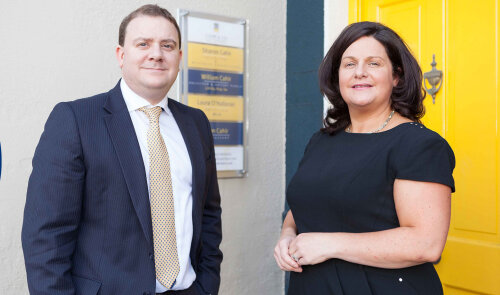Best Child Abuse Lawyers in Ennis
Share your needs with us, get contacted by law firms.
Free. Takes 2 min.
Free Guide to Hiring a Family Lawyer
List of the best lawyers in Ennis, Ireland
About Child Abuse Law in Ennis, Ireland
Child abuse law in Ennis falls under the same national framework that applies across the Republic of Ireland, with local services and agencies based in County Clare providing investigation, support and legal processes. Child protection covers physical abuse, sexual abuse, emotional abuse and neglect. Key public authorities involved locally include Tusla - the Child and Family Agency, An Garda Síochána, local health services and family courts. The law aims to protect a child’s safety and welfare, balance family rights, and ensure suspected abuse is investigated promptly and fairly.
Why You May Need a Lawyer
People seek legal help in child abuse matters for many reasons. Common situations include:
- If a child protection report has been made to Tusla and you need representation at interviews or at court hearings for care, supervision or emergency protection orders.
- If you or a family member is under criminal investigation by An Garda Síochána for allegations involving a child and you need criminal defence advice.
- When family law disputes involving access, guardianship or custody intersect with child protection concerns and require coordinated legal strategy.
- To advise on mandatory reporting duties and your obligations if you work with children or are a professional with concerns.
- To protect a child’s privacy and to seek orders preventing publication of identifying information.
Specialist solicitors experienced in child protection, family law and criminal law can explain rights, represent you in interviews and court, negotiate with agencies and help gather or challenge evidence.
Local Laws Overview
The main laws and legal instruments relevant to child abuse in Ennis include national statutes and statutory guidance that set out duties and procedures. Important points to understand are:
- Children First Act 2015 and Children First national guidance - these set out how suspected abuse should be identified, recorded and reported. The Act introduced mandatory reporting obligations for certain professionals when they have reasonable grounds for concern about a child’s safety or welfare.
- Child Care Act 1991 - provides the statutory framework for Tusla to apply to the courts for care orders, supervision orders and emergency orders where a child is considered at risk of significant harm.
- Criminal law - a range of offences apply where abuse is criminal in nature, including assault, sexual offences and other offences against children. Criminal investigations are led by An Garda Síochána and prosecutions are brought by the Director of Public Prosecutions.
- Family law principles - when disputes over custody, guardianship or access arise alongside protection concerns, the courts make decisions guided by the best interests of the child.
- Data protection and reporting restrictions - there are legal protections to prevent the identification of children in media reports and to manage sensitive personal information. Special rules apply to publication of matters involving children and victims of sexual offences.
Frequently Asked Questions
What counts as child abuse in Ireland?
Child abuse includes physical abuse, sexual abuse, emotional or psychological abuse, and neglect. It covers single incidents and patterns of behaviour that harm a child’s health, development or wellbeing. Whether conduct meets a legal threshold for criminal charges or for child protection intervention depends on the facts and severity.
How do I report suspected child abuse in Ennis?
You can report concerns to Tusla - the Child and Family Agency - which manages child welfare reports, or to An Garda Síochána if a child is in immediate danger or a crime may have been committed. If you are a mandated person under the Children First Act and have reasonable grounds for concern, you must report to Tusla.
What happens after I make a report to Tusla?
Tusla will assess the report to determine whether the concern meets the threshold for further child protection action. This may lead to an initial assessment, a more detailed social work assessment, referrals to services, or a decision to monitor the situation. If the child is considered at immediate risk, Tusla may seek court orders or coordinate with Gardaí to secure protection.
Do I need a solicitor if Tusla is involved?
It is often wise to consult a solicitor if Tusla becomes involved. A solicitor can explain your rights, represent you at any interviews, advise about evidence and documentation, and represent you if Tusla seeks a court order affecting the child’s care or living arrangements.
What rights does someone accused of abuse have?
Anyone accused has the right to legal representation, the right to be informed of allegations, and procedural protections in criminal and child protection processes. In criminal investigations, suspects have rights under Garda procedures including the right to a solicitor during interviews. In child protection matters the focus is on the child’s safety, but parents and guardians have rights to fair process and to contest findings in court.
Can a child be taken into care immediately?
In urgent situations where a child is at immediate risk of harm, Tusla can seek an emergency care order from the court which allows the child to be placed in protective care. Emergency measures are intended for serious or immediate risk situations and are subject to review by the courts.
Is reporting anonymous? Will my identity be shared?
Tusla and Gardaí record the identity of the reporter. Tusla has policies to protect confidentiality and will only share information on a need-to-know basis for the child’s safety and the investigation. If you are concerned about consequences of reporting, discuss this with the agency or a solicitor - protections may be available.
Can I get legal aid for child protection or criminal matters?
Legal aid is available in Ireland for certain civil and criminal matters subject to eligibility and means testing through the Legal Aid Board. If you cannot afford private representation, ask a solicitor or contact the Legal Aid Board to check whether you qualify for assistance in family or criminal proceedings.
What evidence is important in child abuse cases?
Important evidence can include medical reports, photographs of injuries, witness statements, school or care records, text messages or social media records, and timed contemporaneous notes. A solicitor can advise on preserving evidence and the correct procedures for disclosure in both criminal and child protection processes.
How long do investigations and court processes usually take?
There is no fixed timeline. Initial assessments may be completed within days or weeks, while complex social work investigations, family law proceedings or criminal trials can take months. Emergency protection actions happen quickly, while longer term court resolutions may extend longer. Legal advice can help you understand likely timelines for your specific case.
Additional Resources
There are national and local organisations that provide support, information and statutory services for child protection issues. Helpful bodies and resources include:
- Tusla - the Child and Family Agency - responsible for child protection services and assessments.
- An Garda Síochána - local Gardaí provide emergency protection and criminal investigation services.
- Legal Aid Board - for information on eligibility for legal representation and advice.
- ISPCC Childline - confidential support for children and young people.
- Barnardos - support services for children affected by abuse and neglect.
- HSE child protection services and local health professionals for medical assessment and care.
- Courts Service - for information on family and criminal court procedures and victim supports.
- Local solicitors and law firms in Ennis experienced in family law, child protection and criminal defence.
Next Steps
If you are facing a child protection concern or allegation in Ennis, consider these practical next steps:
- If a child is in immediate danger, call emergency services - An Garda Síochána - right away.
- If the concern is not immediate but serious, report it to Tusla so it can be assessed. If unsure, seek advice from a professional or a trusted organisation.
- Seek medical attention for the child if needed. Medical examinations can both address health needs and preserve forensic evidence where appropriate.
- Contact a solicitor with experience in child protection, family law or criminal defence depending on the matter. If you cannot afford private counsel, inquire with the Legal Aid Board about eligibility for assistance.
- Preserve relevant records and evidence - dates, times, names of witnesses, messages, photographs and any official correspondence.
- Avoid posting details on social media that could identify the child or inflame the situation. Protect the child’s privacy and legal rights at all times.
- Keep clear, factual notes of interactions with Tusla, Gardaí and other professionals, including dates and outcomes.
- If you need emotional or practical support, contact local support organisations or national helplines. Professionals can guide you through the process and refer you to counselling and community resources.
Getting expert legal advice early can help you understand your rights and responsibilities, protect the child’s interests and ensure that any legal processes are handled correctly. If you are unsure where to start, a qualified solicitor in Ennis or County Clare can provide an initial consultation and explain the options available to you.
Lawzana helps you find the best lawyers and law firms in Ennis through a curated and pre-screened list of qualified legal professionals. Our platform offers rankings and detailed profiles of attorneys and law firms, allowing you to compare based on practice areas, including Child Abuse, experience, and client feedback.
Each profile includes a description of the firm's areas of practice, client reviews, team members and partners, year of establishment, spoken languages, office locations, contact information, social media presence, and any published articles or resources. Most firms on our platform speak English and are experienced in both local and international legal matters.
Get a quote from top-rated law firms in Ennis, Ireland — quickly, securely, and without unnecessary hassle.
Disclaimer:
The information provided on this page is for general informational purposes only and does not constitute legal advice. While we strive to ensure the accuracy and relevance of the content, legal information may change over time, and interpretations of the law can vary. You should always consult with a qualified legal professional for advice specific to your situation.
We disclaim all liability for actions taken or not taken based on the content of this page. If you believe any information is incorrect or outdated, please contact us, and we will review and update it where appropriate.










